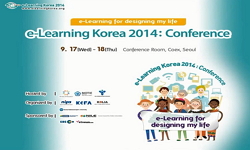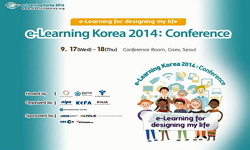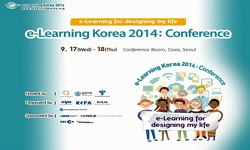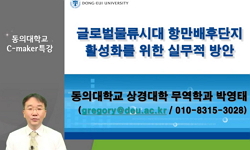The recent advances in scientific and information-communication technologies have propelled Korean society's growth from an industrial to knowledge-based information society. Changes have occurred in virtually every sector including significant change...
http://chineseinput.net/에서 pinyin(병음)방식으로 중국어를 변환할 수 있습니다.
변환된 중국어를 복사하여 사용하시면 됩니다.
- 中文 을 입력하시려면 zhongwen을 입력하시고 space를누르시면됩니다.
- 北京 을 입력하시려면 beijing을 입력하시고 space를 누르시면 됩니다.
국내대학의 이러닝(e-Learning) 활성화 방안 연구 : 충청지역을 중심으로 = Research on strategies for revitalization programs of E-Learning among colleges and universities : Focusing on the Chungcheong area
한글로보기https://www.riss.kr/link?id=T12049496
- 저자
-
발행사항
대전 : 우송대학교 경영대학원, 2007
-
학위논문사항
학위논문(석사) -- 우송대학교 경영대학원 , 경영학전공 , 2007. 8
-
발행연도
2007
-
작성언어
한국어
-
주제어
국내대학 ; 이러닝 ; e-Learning ; 활성화 ; 충청지역
-
KDC
325
-
DDC
658
-
발행국(도시)
대전
-
형태사항
ⅴ, 58 p. ; 26cm
-
일반주기명
지도교수 :김홍기
- 소장기관
-
0
상세조회 -
0
다운로드
부가정보
다국어 초록 (Multilingual Abstract)
However, the implementation of e-Learning systems by domestic colleges is rather low when compared with the wide-spread use by private persons, government, and public institutions.
To investigate the practicality of future changes to and the extent of current e-Learning systems by colleges in the Chungcheong area, this study surveyed the programs' demographic characteristics and performed reliability tests, factorial analyses, and feasibility tests using SPSSWIN 10.0. Factors and problems that hinder the revitalization of e-Learningby colleges in the Chungcheong area were deduced through mean and standard deviation analyses and the e-Learning revitalization program was examined based on these results.
The research data reveals that to revitalize e-Learning in colleges throughout the Chungcheong area, it is necessary to devise a program capable of quickly responding to problems during this study, improving follow-up action with respect to the study, and enhancing the consciousness of and participation by learners.
There needs to be a greater investment in e-Learning and support policies that meet the operation requirements to increase the supply rate of e-Learning. Since the revelation that phased learning by grade matching the competence of learners is difficult, it is necessary to develop grade-appropriate content for the learners.
The recent advances in scientific and information-communication technologies have propelled Korean society's growth from an industrial to knowledge-based information society. Changes have occurred in virtually every sector including significant changes in the delivery of education.
However, the implementation of e-Learning systems by domestic colleges is rather low when compared with the wide-spread use by private persons, government, and public institutions.
To investigate the practicality of future changes to and the extent of current e-Learning systems by colleges in the Chungcheong area, this study surveyed the programs' demographic characteristics and performed reliability tests, factorial analyses, and feasibility tests using SPSSWIN 10.0. Factors and problems that hinder the revitalization of e-Learningby colleges in the Chungcheong area were deduced through mean and standard deviation analyses and the e-Learning revitalization program was examined based on these results.
The research data reveals that to revitalize e-Learning in colleges throughout the Chungcheong area, it is necessary to devise a program capable of quickly responding to problems during this study, improving follow-up action with respect to the study, and enhancing the consciousness of and participation by learners.
There needs to be a greater investment in e-Learning and support policies that meet the operation requirements to increase the supply rate of e-Learning. Since the revelation that phased learning by grade matching the competence of learners is difficult, it is necessary to develop grade-appropriate content for the learners.
목차 (Table of Contents)
- 제 1 장 서론 = 1
- 제 1 절 연구의 배경과 목적 = 1
- 1. 연구의 배경 = 1
- 2. 연구의 목적 = 3
- 제 2 절 연구의 방법 및 구성 = 3
- 제 1 장 서론 = 1
- 제 1 절 연구의 배경과 목적 = 1
- 1. 연구의 배경 = 1
- 2. 연구의 목적 = 3
- 제 2 절 연구의 방법 및 구성 = 3
- 제 2 장 이론적 배경 및 선행연구 = 5
- 제 1 절 이러닝의 정의 = 5
- 제 2 절 이러닝의 특징 = 8
- 제 3 절 이러닝 교육의 장·단점 = 11
- 1. 장점 = 11
- 2. 단점 = 13
- 제 4 절 선행연구 = 14
- 1. 이러닝 활성화 요인에 관한 선행연구 = 14
- 2. 사용자 만족에 관한 선행연구 = 16
- 3. 학습자 특성에 관한 선행연구 = 18
- 제 3 장 국내 이러닝 활용현황 = 20
- 제 1 절 국내 이러닝 시장현황 = 20
- 제 2 절 국내 대학의 이러닝 활용실태 = 24
- 제 4 장 실증분석 설계 = 28
- 제 1 절 설문지 구성 = 28
- 1. 연구 대상자의 일반적 배경 설문 = 28
- 2. 이러닝 만족도에 관한 설문 = 28
- 제 2 절 분석방법 = 30
- 제 3 절 연구의 한계 = 30
- 제 5 장 실증분석 = 32
- 제 1 절 표본의 특성 = 32
- 제 2 절 조사 자료의 분석 = 34
- 1. 신뢰도 검증 = 34
- 2. 요인 분석 = 37
- 3. 타당도 검증 = 42
- 4. 이러닝 4가지 만족 요인에 대한 만족도 분석 = 43
- 제 6 장 결론 및 제언 = 48
- 참고 문헌 = 51
- 설문지 = 54
- Abstract = 57
분석정보
연관 공개강의(KOCW)
-

2014 이러닝 국제 콘퍼런스 : Developing the PETAL e-Learning Platform~
한국교육정보진흥협회 Vincent Tam -

2014 이러닝 국제 콘퍼런스: Analysis of e-Learning Program Management for Adults in Korea
한국교육정보진흥협회 Don-Min, Choi -

2014 이러닝 국제 콘퍼런스 : Understand Seniors’ Motivation in e-Learning through
한국교육정보진흥협회 Thomas Kuan -

글로벌물류시대 항만배후단지 활성화를 위한 실무적 방안
동의대학교 박영태 -

146회 미래교육포럼: 교육데이터 활용 활성화를 위한 전문가 포럼
한국교육학술정보원 한국교육학술정보원







